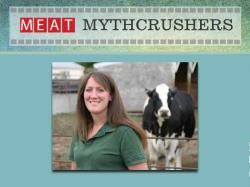Latest Mythcrushers Addresses Misperceptions About Impact Of Cattle Operations
February 17, 2012 | 2 min to read

Champaign, Il – The American Meat Science Association (AMSA) in conjunction with the American Meat Institute, has launched the fifth installment of seven new myth-crushing videos. The newest video, featuring Judith Capper, Ph.D., associate professor, department of animal sciences, Washington State University, aims to set the record straight about myths associated with the environmental impact of large modern cattle operations.
The video explains the fallacy behind the common misperception that larger, modern cattle operations have a greater negative environmental impact than small, local operations. “That’s a common consumer misperception,” Capper says. “The first thing we have to understand is that generally the bigger the operation, the more modern it is, the more accepting of technology, the lower the land use, the water use and the carbon footprint.”
Dr. Capper notes than many consumers are not aware of the transportation efficiencies that we have gained over the last hundred years or so.
“Actually, to truck beef, for example to Kansas to Iowa, has a far, far lower carbon footprint than to air freight it, for example, or to drive locally to a farm, buy it and take it home again,” Capper notes.
She also addresses the common myth that grass-fed beef has a smaller environmental impact than beef finished on corn or grain. “The grass-fed system) has a greater number of days from birth to harvest, the animals grow more slowly and that means overall they use more land, more water, more energy, and more fuel and have a far greater carbon footprint than animals grown on corn,” Capper says.
Capper’s video is available at http://www.meatmythcrushers.com/
AMSA fosters community and professional development among individuals who create and apply science to efficiently provide safe and high quality meat defined as red meat (beef, pork and lamb), poultry, fish/seafood and meat from other managed species.
Source: American Meat Science Association
